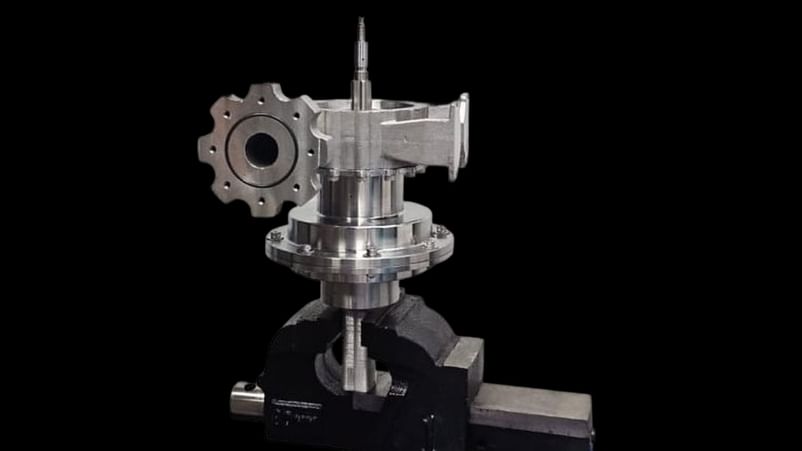Science
Astrophel Aerospace Unveils Indigenous Cryogenic Pump for Astra C1 Rocket

Astrophel Aerospace has achieved a significant milestone by developing an indigenous cryogenic pump for its Astra C1 rocket. This advancement positions Astrophel among the few New Space startups in India capable of creating such sophisticated technology. The company aims to enhance its launch vehicle capabilities, contributing to the growing demand for microsatellites and nanosatellites.
The cryogenic pump comprises over fifty precisely engineered components and operates at an impressive speed of 25,000 RPM. Astrophel plans to implement a fully-fledged turbopump during the first and second stages of the Astra C1 rocket’s launch. Notably, approximately eight to nine turbopumps are necessary for the initial stage of the Indian Space Research Organisation’s (ISRO) Small Satellite Launch Vehicle (SSLV).
Despite its compact size, comparable to a one-liter bottle, the cryogenic pump generates between 100 and 150 horsepower. For context, this power output is similar to that of a family car. The turbopump currently under development by Astrophel is designed to provide between 500 and 600 horsepower for larger launch vehicles, significantly increasing thrust capacity.
Innovative Manufacturing Approach
Astrophel’s cryogenic pump employs lean manufacturing principles derived from the automotive sector, focusing on cost efficiency, rapid assembly, and scalable production. This approach marks a departure from the conventional methods used by many New Space startups in India, which typically rely on 3D printed electric pumps for their launch vehicles.
Suyash Bafna, cofounder of Astrophel Aerospace, emphasized the importance of this development, stating, “This milestone is a testament to how India can indigenously develop advanced propulsion technologies at a fraction of global costs. ISRO’s certification will validate not just our pump, but India’s ability to innovate world-class space hardware with global export opportunities.”
Next Steps and Global Collaborations
The next phase involves testing and certification of the cryogenic pump by ISRO, which will ensure its reliability and performance standards. Furthermore, Astrophel Aerospace is negotiating a memorandum of understanding (MoU) with a partner based in the United States and is actively exploring international collaborations. These partnerships aim to facilitate exports at the sub-component level to not only support the space industry but also cater to the energy sector handling cryogenic liquids.
Astrophel Aerospace’s advancements reflect a growing trend in India’s space sector, as the country seeks to harness indigenous technologies to meet increasing global demands while maintaining cost efficiency. The successful development and certification of the cryogenic pump could pave the way for more competitive and innovative solutions in the aerospace industry.
-

 Entertainment2 months ago
Entertainment2 months agoAnn Ming Reflects on ITV’s ‘I Fought the Law’ Drama
-

 Entertainment3 months ago
Entertainment3 months agoKate Garraway Sells £2 Million Home Amid Financial Struggles
-

 Health2 months ago
Health2 months agoKatie Price Faces New Health Concerns After Cancer Symptoms Resurface
-

 Entertainment2 months ago
Entertainment2 months agoCoronation Street’s Carl Webster Faces Trouble with New Affairs
-

 Entertainment2 months ago
Entertainment2 months agoWhere is Tinder Swindler Simon Leviev? Latest Updates Revealed
-

 Entertainment3 months ago
Entertainment3 months agoKim Cattrall Posts Cryptic Message After HBO’s Sequel Cancellation
-

 Entertainment2 months ago
Entertainment2 months agoOlivia Attwood Opens Up About Fallout with Former Best Friend
-

 Entertainment2 months ago
Entertainment2 months agoMasterChef Faces Turmoil as Tom Kerridge Withdraws from Hosting Role
-

 Entertainment3 months ago
Entertainment3 months agoMarkiplier Addresses AI Controversy During Livestream Response
-

 Entertainment4 months ago
Entertainment4 months agoSpeculation Surrounds Home and Away as Cast Departures Mount
-

 World2 months ago
World2 months agoCole Palmer’s Mysterious Message to Kobbie Mainoo Sparks Speculation
-

 Entertainment2 months ago
Entertainment2 months agoITV’s I Fought the Law: Unraveling the True Story Behind the Drama





















